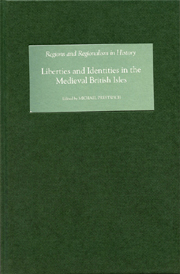Book contents
- Frontmatter
- Contents
- List of maps
- Abbreviations
- Introduction
- 1 States, liberties and communities in medieval Britain and Ireland (c.1100–1400)
- 2 Arbitration and Anglo-Scottish border law in the later middle ages
- 3 Peacekeepers and lawbreakers in medieval Northumberland, c.1200–c.1500
- 4 War, lordship, and community in the liberty of Norhamshire
- 5 The lordship of Richmond in the later middle ages
- 6 ‘Tam infra libertates quam extra’: Liberties and military recruitment
- 7 Neighbours from Hell? Living with Tynedale and Redesdale, 1489–1547
- 8 Striving for Marcher liberties: The Corbets of Caus in the thirteenth century
- 9 Franchises north of the border: Baronies and regalities in medieval Scotland
- 10 The liberties of Ireland in the reign of Edward I
- Index
8 - Striving for Marcher liberties: The Corbets of Caus in the thirteenth century
Published online by Cambridge University Press: 12 September 2012
- Frontmatter
- Contents
- List of maps
- Abbreviations
- Introduction
- 1 States, liberties and communities in medieval Britain and Ireland (c.1100–1400)
- 2 Arbitration and Anglo-Scottish border law in the later middle ages
- 3 Peacekeepers and lawbreakers in medieval Northumberland, c.1200–c.1500
- 4 War, lordship, and community in the liberty of Norhamshire
- 5 The lordship of Richmond in the later middle ages
- 6 ‘Tam infra libertates quam extra’: Liberties and military recruitment
- 7 Neighbours from Hell? Living with Tynedale and Redesdale, 1489–1547
- 8 Striving for Marcher liberties: The Corbets of Caus in the thirteenth century
- 9 Franchises north of the border: Baronies and regalities in medieval Scotland
- 10 The liberties of Ireland in the reign of Edward I
- Index
Summary
The frontier between Wales and the English county of Shropshire may seem an odd place to seek clues to the origins of Marcher liberties. The lordships established there lay on the frontier, along Offa's Dyke, but they were peripheral to foreign-occupied Wales. The lordships of Oswestry, Caus and Clun all originated soon after 1066, but not as conquests of Welsh territory. Rather did they first take shape as compact honors created in the westernmost hundreds of Shropshire by Roger of Montgomery, the first earl of Shrewsbury (d.1094). To claim that these lordships bear on the history of Marcher liberties is already to take a side in the debate on the origins of those liberties. It implies a challenge to the view of J.G. Edwards, according to which the lords of the Welsh March acquired their quasi-regal privileges from the Welsh rulers whose commotes and cantreds they conquered. Of course, Edwards' view has been challenged before. In 1978, R.R. Davies argued that Marcher liberties, which included the right to wage war and broker truces, were in origin simply the necessary expedients of local military commands. According to Davies, Marcher liberties were only perceived as such once royal government had grown so intrusive that the Marcher lords found it necessary to defend and define their liberties – that is, from the end of the twelfth century, and particulary from around 1240. Davies' argument, which develops and applies H.M. Cam's on the English franchises, and which implies that Marcher liberties were a sign of a strong state, is highly relevant to the history of the lordships of the Shropshire frontier.
- Type
- Chapter
- Information
- Liberties and Identities in the Medieval British Isles , pp. 141 - 154Publisher: Boydell & BrewerPrint publication year: 2008



